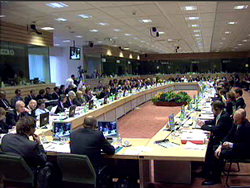Paris, November 27th 2008 − The EU Council reached a political agreement on the telecommunication reform (“Telecoms Package”) on Thursday, Nov. 27th. On one hand, crucial modifications to the text finally doom Nicolas Sarkozy’s project to impose graduated response to the whole Europe. On the other hand, important safeguards to citizen’s fundamental rights and freedoms were deleted. The agreed text lowers the protection of privacy in the EU, in the name of “security”.

During last weeks, citizens from many European countries1Letters were sent and published from Czech Republic, France, Germany, Netherlands, Poland, Portugal, Spain, United Kingdom, etc. raised awareness of their ministers representatives in Council on the Telecoms Package, by meeting them, sending letters, alerting the press, etc. This intense activity undoubtedly helped modifying critical parts of the text agreed by the ministers of the twenty-seven Member States.
The dispositions imposing the “graduated response” scheme in the European Union (or “three strikes and you’re out”) were neutralized in the Council’s version. This is a striking blow at the entertainment industries who spent much effort2Privacy: Film industry pirates European law.
http://www.laquadrature.net/en/privacy-film-industry-pirates-european-law in promoting it.
But the agreed text contains major problems:
- An unacceptable revision has been made to Art.6, par.6 of ePrivay directive3Formerly amendment 181 adopted by European Parliament., allowing private operators to collect and process traffic data and exonerate from current privacy rules. This exoneration is so broad that it allows any web company to process any citizen’s4Whether they are clients from this operator or not. data for broad, undefined purposes and for a potentially infinite duration. This is a frightening decline, openly ignoring the European Data Protection Supervisor (EDPS)’s recommendations5“Because [the provision] is broadly constructed, for example, […] it does not limit the type of entities (data controllers) it is meant to apply, the EDPS is concerned that it could be interpreted too broadly. In particular, the EDPS is concerned that it could be used to legitimise the collection of traffic data for purposes that are not purely security related. He is also concerned that it could open the door for anyone, not only providers of security services and products, to process traffic data alleging to do it for security purposes.”
http://www.laquadrature.net/wiki/EDPS_Comments_Telecoms_Package_IMCO that were followed by the European Parliament. - The Bono/Cohn-Bendit/Roithova amendment 138 (Art.8, par.4 (ga) of the Framework directive), restating an essential principle of protection of fundamental rights and freedom in European law, has been removed. Deletion of amendment 138, on the vague pretext that the wording was too broad, is in opposition with the democratic expression of 88% of the Members of European Parliament (MEPs) and the European Commission. It clearly shows from the Council a disturbing lack of political courage in protecting citizens’ fundamental rights and Freedom.
- The dispositions related to “cooperation in the promotion of lawful content” (Art.33 par.2a of Universal Service directive), still included in the text, must be deleted as well as the related recitals. These texts were pushed by the French cinema lobby to introduce the graduated response. Their vague wording could still be used by national governments to violate fundamental rights of their citizens until a European court remind them the law. This is exactly what France aims to do in few weeks with its “graduated response” law.
“It is not tolerable that the Council deleted crucial implementations of fundamental principles. The Council lets Nicolas Sarkozy free to violate French citizen’s rights with his national project of ‘graduated response’. The Commissioner, Viviane Reding, has been quite alone not to share this Pilate’s position. The Commission even recalled today6French newspaper La Tribune published today the Commission response to France’s obligation of notification for its “graduated response” law : http://www.latribune.fr/entreprises/communication/telecom-internet/20081127trib000314818/loi-antipiratage-sur-internet-les-observations-de-bruxelles-.html that this project is a freedom-killer.” explained Gérald Sédrati-Dinet, analyst for La Quadrature du Net (Squaring the Net).
“The Council’s agreement failed to protect fundamental rights by deleting two important safeguards. Let’s hope the European Parliament will fight against industry lobbies during the second reading and finally clean up the whole package. No compromise must be made in preserving the right to a due process and privacy in the digital environnement.” concluded Jérémie Zimmermann, co-founder and coordinator of La Quadrature.
References

